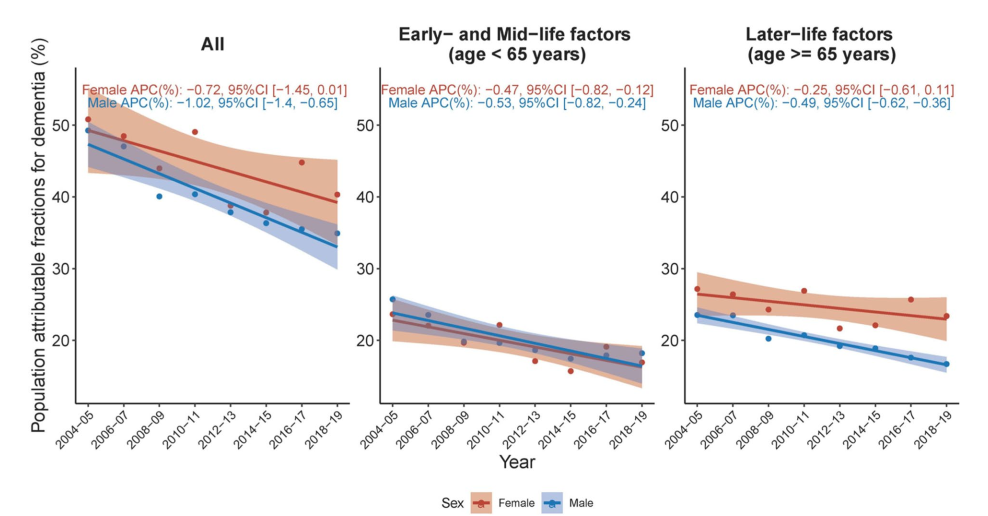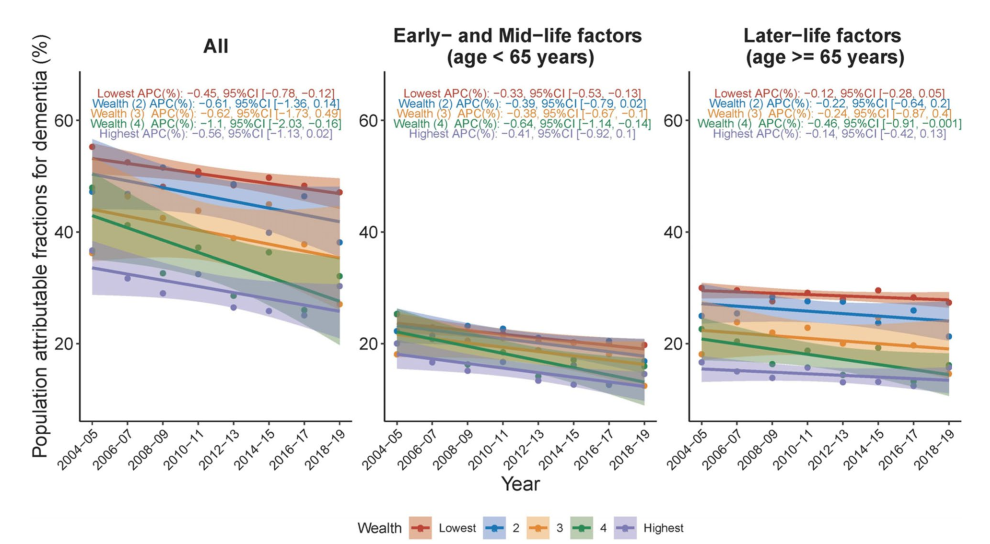
Introduction
Dementia is the second leading cause of disability-adjusted life years (DALY) in the UK, with cases expected to rise from 0.89 million in 2019 to nearly 1.6 million by 2040 due to an ageing population. Despite extensive research, no disease-modifying drugs are approved in the UK, highlighting the need to focus on modifiable risk factors (MRFs) for prevention. A 5% reduction in dementia incidence could save around £3.7 billion by 2040. Since 85% of dementia cases in the UK are in England, a recent, comprehensive 15-year study examines the evolving scenario of modifiable risk factors for dementia in England. It explores the proportion of dementia cases attributable to MRFs, identifies the primary MRFs, examines temporal trends, and assesses differences by sex and socioeconomic status (SES). The study’s insights are vital for tailoring future interventions to meet the unique needs of different groups.
Evaluating Modifiable Risk Factors
Analysing data from the English Longitudinal Study of Ageing (ELSA) between 2004 and 2009, the research reveals a slight decline in MRF population attributable fraction (PAF). However, a substantial 38% of dementia cases in 2018/2019 remain attributable to these factors. Researchers focused on identifying trends in modifiable risk factors for dementia. These factors include lifestyle choices, health conditions, and social determinants.
Lifestyle choices significantly influence dementia risk. Factors such as physical inactivity, poor diet, and smoking were identified as major contributors. Encouraging healthier lifestyles through public health campaigns can play a crucial role in dementia prevention. Promoting physical activity and balanced diets can help reduce the incidence of dementia.
Certain health conditions were found to increase dementia risk. Hypertension emerges as the primary driver, followed by obesity, social isolation, and other key factors. Managing these conditions through regular medical check-ups and appropriate treatments is essential. Early intervention can help mitigate their impact on dementia risk, improving overall health outcomes.
Addressing Sex and Socioeconomic Disparities
The study revealed notable differences in dementia risk between men and women. Women, particularly those with lower SES, are at a higher risk. These findings suggest that gender-specific strategies may be necessary to effectively mitigate dementia risk. Tailoring interventions to address these differences can enhance their effectiveness.

SES plays a significant role in dementia risk. The study found that individuals with lower SES are more likely to develop dementia. This correlation highlights the need for targeted interventions in socioeconomically disadvantaged groups. Addressing SES-related disparities can help reduce the overall burden of dementia.

Implications for Policy and Practice
The findings demonstrate the persistent influence of MRFs on dementia incidence and the need for sustained efforts in preventative strategies. While successes in addressing factors like social isolation and low education are evident, challenges persist with factors such as diabetes and air pollution. The research advocates for collective-level interventions targeting risk factors across the lifespan, emphasising the importance of tailored approaches for different demographic groups.
Conclusion
By providing a nuanced understanding of dementia risk factors in England, this study offers valuable insights for shaping future preventive strategies. While advancements have been made in addressing certain risk factors, persistent challenges remain, necessitating a multifaceted approach that considers sex and socioeconomic disparities to achieve equitable healthcare outcomes and mitigate the increasing societal costs associated with dementia. Furthermore, future research should consider the impact of the COVID-19 pandemic on dementia risk. Understanding how the pandemic affects older adults and those with cognitive impairment is crucial for developing effective prevention strategies. Moving forward, targeted and sustained efforts are essential to combat the evolving scenario of dementia risk factors and reduce the burden on individuals and society.
